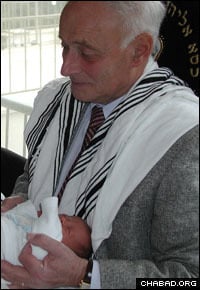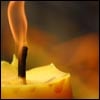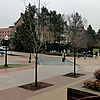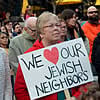A year after Virginia Tech engineering professor Liviu Librescu saved the lives of 21 of his students by giving up his own, his family, colleagues and those he saved remembered the man as possessing a constant love of mankind, and an earnest devotion to education.
Librescu perished April 16, 2007, when gunman Seung-Hui Cho opened fire on classrooms at Virginia Tech's Norris Hall, killing 32. A Romanian-born Jew and survivor of World War II and Communist rule, Librescu blocked the door to his lecture hall with his body so that his class could escape. This past Shabbat marked the first anniversary of his death on the Hebrew calendar.
In an interview with the National Committee for Furtherance of Jewish Education – a Chabad-Lubavitch institution in New York – for its "Courage Under Fire" documentary, Ishwar Puri, head of Virginia Tech's engineering science and mechanics department, called attention to "Prof. Librescu's respect" for the students.
"His students undoubtedly liked him, like a grandfather," said Puri. He was "not just a professor, not just a teacher. He was approachable in the sense that students had inserted him in a much more important way into their lives than one would simply insert a teacher or a professor into one's life."
Former student Yang Kim agreed.
"He was so passionate [about] teaching," said Kim. "He loved his work. He was really caring for his students."
Kim added that when the gunshots began reverberating through the halls of their building, the professor jumped to action. Though no one knows exactly what went Librescu's mind in the last moments of his life, Kim said that it was certainly not about himself.
"We all tried to survive," said the former student. "But he stayed and tried to help the other students that were in there."
Life of Dedication

Following the war and the family's reunification, Romania's new Communist government forbid Librescu's father from practicing law. Librescu continued to work.
"He never took from his money to buy a candy," his wife, Marlena Librescu, said. One winter, he told his parents: "I am feeling very warm with my short pants. I am happy, you don't have to buy for me."
"He never spoke about what he had to do to get through," said son Aryeh Librescu. "He would tell us sometimes that when he had to study, his study conditions were no conditions."
Continuing his education even while he helped support his family, Librescu received his bachelor of science degree in 1952, and a masters degree from the Polytechnic Institute of Bucharest in 1953. He earned his doctorate from the Institute of Fluid Mechanics at the Academy of Science of Romania in 1969.
But despite working as a sought-out researcher, Communist rules barred him from teaching.

As a Jew, he couldn't obtain a passport to attend international conferences.
"He was discriminated against," continued his wife. But "Liviu never discriminated [against] anybody. He only [looked] at the good of the person, if he was an honest person or if he was a hard worker."
Forced out of academia in 1975 because of his wish to immigrate to Israel, Librescu was finally able to move three years later after the personal intervention of Israeli Prime Minister Menachem Begin.
Soon after, he was hired by Tel Aviv University.
"Liviu was a remarkable scientist," said Ishwar. "It is not just the work that he did in the United States or in Israel, but his scientific career began long ago in Romania, where he was working under the Communist government."
In Israel, he mastered the Hebrew language in order to teach graduate and undergraduate students. He did the same with English when he moved to Blacksburg, Va., in 1985.

"Both of us liked very much on Friday evening the light of Shabbos," she said later. "I think that this gave him the power to do what he has done, and I wish that Jewish people will continue to feel that they are Jewish."
"What is remarkable for me," said Ishwar, "is the fact that a Holocaust survivor was able to pick himself up, educate himself, live life in tolerance, without bitterness towards society, and make the kinds of decisions he made on April 16."
"Every good thing that happened after this tragedy and from his sacrifice will bring me some comfort," said Marlena Librescu. "His sacrifice was not in vain. It brings something better in this world."









Start a Discussion